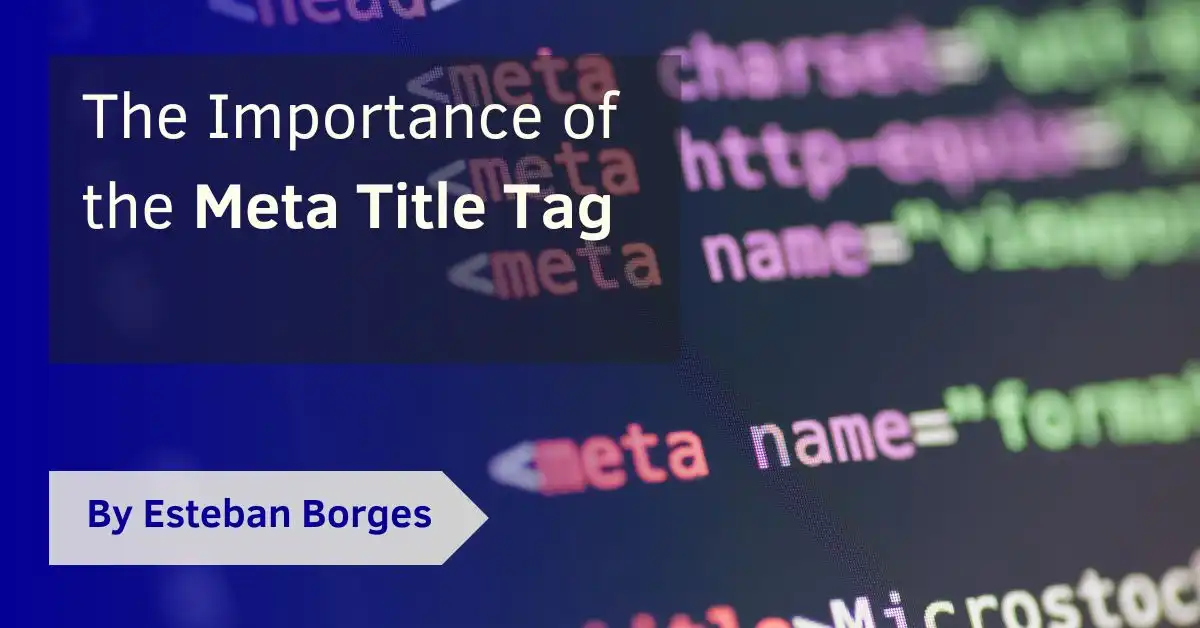The Author Meta Tag: Transforming Your Content with Credibility
When it comes to optimizing your website for search engines, meta tags play a crucial role. While you may already be familiar with meta tags like the ‘Meta Title Tag,’ ‘Meta Keywords,’ and ‘Meta Description,’ there’s another essential meta tag that deserves your attention: the Author Meta Tag (also referred to as the ‘Author SEO Tag’). In this post, we’ll explore the significance of the Author Meta Tag in boosting credibility and personalizing your content.
Table of Contents
Understanding the Author Meta Tag
The Author Meta Tag is a snippet of HTML code that allows you to identify and showcase the author of a particular piece of content. By including the Author Meta Tag, you can establish a personal connection with your audience and build credibility by attributing the content to a real person.
Benefits of Using the Author Meta Tag
Improving Credibility and Trust
In the vast ocean of online content, establishing trust with your readers is paramount. By prominently displaying the author’s name through the Author Meta Tag, you can instill confidence and credibility in your audience. Knowing that a real person stands behind the content can significantly impact how readers perceive and engage with your material.
Personalizing Your Content
In today’s digital landscape, forging a genuine connection with your audience is vital. The Author Meta Tag enables you to infuse your content with a personal touch. By revealing your name, readers can relate to you as an individual, creating a sense of familiarity that enhances their overall experience. This personalization can foster deeper engagement, increased social sharing, and ultimately, better SEO performance.
The Impact of Author SEO Tag on User Engagement
One significant advantage of utilizing the Author SEO Tag is its ability to positively impact user engagement. When readers can connect a piece of content to a specific author, they are more likely to engage with it. By knowing the author’s identity, readers can develop a sense of trust and familiarity, which encourages them to spend more time on the website, explore related articles, and even share the content on social media platforms. Increased user engagement not only improves the overall user experience but also sends positive signals to search engines, potentially leading to higher rankings.
Establishing Author Expertise with the Author SEO Tag
In addition to credibility and personalization, the Author SEO Tag can also help establish the author’s expertise within a particular field. When readers consistently encounter high-quality content from a trusted author, they begin to associate that author with expertise and authority. This perception can further enhance the credibility of the content and drive more traffic to the website. As a result, implementing the Author Meta Tag becomes an effective strategy for positioning oneself as an industry thought leader and attracting a loyal audience.
Optimizing Author Profiles for Enhanced Personalization
While the Author SEO Tag primarily focuses on attributing content to authors, it can also be leveraged to optimize author profiles. By creating comprehensive author profiles on your website, including relevant information such as a professional bio, social media links, and a profile picture, you can provide readers with a complete picture of the author behind the content. This additional personalization not only enhances the user experience but also contributes to better brand recognition and trust-building.
The Role of the Author Meta Tag in the EAT Algorithm
It’s important to note that the Author Meta Tag aligns with the principles of the EAT algorithm (Expertise, Authoritativeness, Trustworthiness). Google’s EAT algorithm considers these factors when assessing the quality and relevance of content. By implementing the Author Meta Tag, you help demonstrate transparency, establish authorship, and enhance credibility, all of which contribute to the EAT signals. For more information on the EAT algorithm and its impact on search rankings, you can explore this article on Understanding Google’s EAT Algorithm.
Implementing the Author SEO Tag
To implement the Author SEO Tag effectively, follow these steps:
- Use the appropriate HTML code:
<meta name="author" content="Your Name">. - Provide your full name: Including your full name helps avoid ambiguity and ensures accurate identification.
- Leverage structured data: Implement structured data markup, such as JSON-LD or Microdata, to provide additional context to search engines. This article on meta keywords and SEO can provide further insights into optimizing your content.
For more in-depth information on the importance of meta tags, consider exploring the following article: Importance of Meta Descriptions: Learn about the importance of meta descriptions in enticing users and improving your click-through rates.
Conclusion
In the competitive realm of online content, leveraging every opportunity to stand out is essential. The Author Meta Tag empowers you to boost credibility, personalize your content, and establish your unique voice in the digital landscape. By implementing this tag effectively, you open doors to increased recognition, trust, and engagement. Embrace the power of the Author Meta Tag and unlock the full potential of your content strategy. Remember, optimizing your content with the Author Meta Tag is just one piece of the puzzle. Consistently creating valuable and engaging content that resonates with your audience remains crucial for your digital success.
In addition, it’s important to stay updated with evolving SEO practices. For more information on optimizing your website, you can refer to reputable sources such as Google’s Search Engine Optimization (SEO) Starter Guide and Moz’s Beginner’s Guide to SEO.
Remember, the success of your content strategy depends on a holistic approach that encompasses high-quality content, proper optimization, and a personalized touch through the Author Meta Tag.



